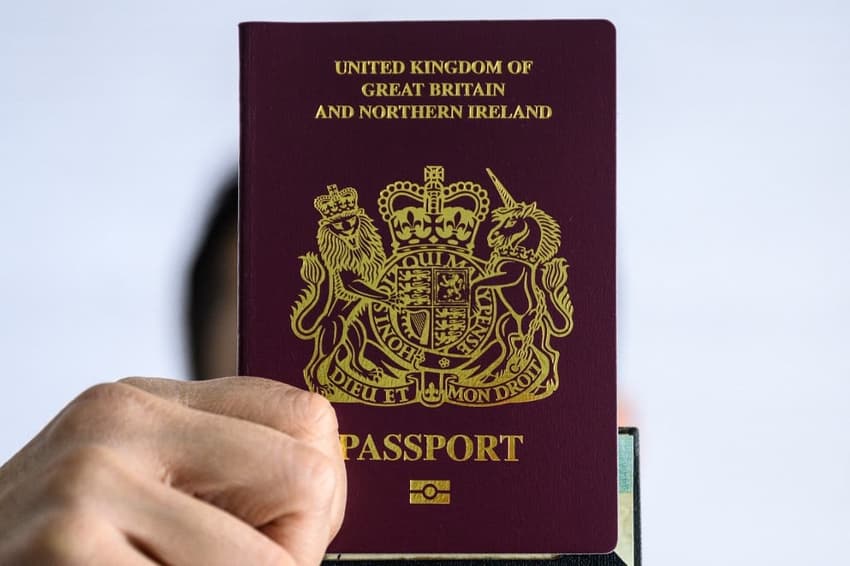Brexit: EU asks border police not to stamp passports of British residents

The European Commission has asked border police from member states across the bloc not to stamp the passports of those British nationals protected by the Brexit Withdrawal Agreement.
Britons living across the EU have long been concerned about the knock-on effect of their passport being wrongly stamped when travelling in and out of the Schengen zone.
While British officials at embassies across Europe have repeatedly stressed the passports of those Britons protected by the Brexit deal should not be stamped, those instructions appear not to have filtered through to border guards.
The erroneous stamps have left many passport holders resident in the EU worrying about being accused of overstaying the 90-day limit in their host country.
This week the EU Commission has stressed that passports should not be stamped, but reassured Britons that if they are there will be no negative consequences.
"The Commission recommends – notably as regards beneficiaries of the Withdrawal Agreement – that Member State border guards refrain from stamping. In any case, should stamping nevertheless take place, such stamp cannot affect the length of the authorised long-term stay," read their latest guidance.
"EU law does not prevent border guards from stamping upon entry to and exit from the Schengen area of travel documents of United Kingdom nationals who are beneficiaries of the Withdrawal Agreement who are in possession of a valid residence permit issued by a Schengen Member State. The same applies to their family members in the same situation."
The Commission added that the usual limitation of a stay of 90 days in a 180 days’ period in the Schengen area does not apply to Britons covered by the Withdrawal Agreement "irrespective of whether their passport has been stamped or not".
But it reminded Britons that they only have the right to stay in their country of residence. If they travel within the Schengen area to another EU country they are subject to the 90 day rule.
It recommended Britons "proactively present" their post-Brexit residency cards - if they have one - at the border to prove their status. However not all Britons in the EU have post-Brexit residency cards because they are only compulsory in certain countries.
Britons in countries such as Spain and Italy, where the cards are not obligatory but available, are urged to apply as soon as possible.
Those who don't have the cards are told to use any documentation "that credibly proves that the holders exercised the right to move and reside freely in the host Member State before the end of the transition period and continue to reside there."
"Documents indicating the address of the person can show continued residence after the end of the transition period. "
Comments (4)
See Also
Britons living across the EU have long been concerned about the knock-on effect of their passport being wrongly stamped when travelling in and out of the Schengen zone.
While British officials at embassies across Europe have repeatedly stressed the passports of those Britons protected by the Brexit deal should not be stamped, those instructions appear not to have filtered through to border guards.
The erroneous stamps have left many passport holders resident in the EU worrying about being accused of overstaying the 90-day limit in their host country.
This week the EU Commission has stressed that passports should not be stamped, but reassured Britons that if they are there will be no negative consequences.
"The Commission recommends – notably as regards beneficiaries of the Withdrawal Agreement – that Member State border guards refrain from stamping. In any case, should stamping nevertheless take place, such stamp cannot affect the length of the authorised long-term stay," read their latest guidance.
"EU law does not prevent border guards from stamping upon entry to and exit from the Schengen area of travel documents of United Kingdom nationals who are beneficiaries of the Withdrawal Agreement who are in possession of a valid residence permit issued by a Schengen Member State. The same applies to their family members in the same situation."
The Commission added that the usual limitation of a stay of 90 days in a 180 days’ period in the Schengen area does not apply to Britons covered by the Withdrawal Agreement "irrespective of whether their passport has been stamped or not".
But it reminded Britons that they only have the right to stay in their country of residence. If they travel within the Schengen area to another EU country they are subject to the 90 day rule.
It recommended Britons "proactively present" their post-Brexit residency cards - if they have one - at the border to prove their status. However not all Britons in the EU have post-Brexit residency cards because they are only compulsory in certain countries.
Britons in countries such as Spain and Italy, where the cards are not obligatory but available, are urged to apply as soon as possible.
Those who don't have the cards are told to use any documentation "that credibly proves that the holders exercised the right to move and reside freely in the host Member State before the end of the transition period and continue to reside there."
"Documents indicating the address of the person can show continued residence after the end of the transition period. "
Join the conversation in our comments section below. Share your own views and experience and if you have a question or suggestion for our journalists then email us at [email protected].
Please keep comments civil, constructive and on topic – and make sure to read our terms of use before getting involved.
Please log in here to leave a comment.